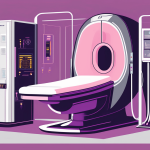Prostate cancer treatment has undergone significant advancements, offering hope for better outcomes. This article explores the latest developments, from understanding the disease biology to personalized medicine and AI. Discover the role of radioligand therapy and targeted therapy in managing prostate cancer. Learn about genetic testing’s potential in tailoring treatment plans and how AI aids in diagnosis and decision-making. Stay informed to collaborate effectively with healthcare teams, maximizing treatment effectiveness and improving quality of life. Exciting prospects lie ahead in the quest for better prostate cancer management.
Prostate cancer is a common concern for many individuals, especially as they age. The good news is that there have been significant advancements in the field of prostate cancer treatment, offering hope and improved outcomes for patients. In this article, we will explore the latest advances in prostate cancer treatment, from understanding the biology of the disease to the future of personalized medicine and the role of artificial intelligence. So, let’s dive in and explore these exciting new developments that are changing the landscape of prostate cancer treatment.
Understanding Prostate Cancer
Before we delve into the latest advancements in prostate cancer treatment, let’s take a moment to understand the disease itself. Prostate cancer begins when cells in the prostate gland, a small walnut-shaped organ, start to grow uncontrollably. This gland is an essential part of the male reproductive system, producing the fluid that nourishes and transports sperm. While the exact cause of prostate cancer is unknown, certain risk factors such as age, family history, and ethnicity have been identified.
Age is a significant risk factor for prostate cancer, with the disease being more common in men over the age of 50. As men age, the risk increases exponentially, making regular screenings and awareness crucial for early detection. Family history also plays a role, as men with close relatives who have had prostate cancer are more likely to develop the disease themselves. Additionally, ethnicity can influence the risk, with African American men having a higher incidence rate compared to men of other ethnic backgrounds.
The Biology of Prostate Cancer
Prostate cancer is a complex disease, and researchers continue to uncover new insights into its biology. Understanding the molecular mechanisms behind prostate cancer allows scientists and medical professionals to develop targeted treatments that specifically address the unique characteristics of each individual’s cancer. The prostate gland consists of different types of cells, including glandular cells that produce the prostate fluid and stromal cells that provide structural support. It is within these cells that the genetic mutations and abnormalities occur, leading to the development of cancer.
One of the key factors in prostate cancer progression is the androgen receptor, a protein that plays a crucial role in the growth and development of the prostate gland. In prostate cancer, the androgen receptor can become overactive, leading to uncontrolled cell growth and tumor formation. This knowledge has paved the way for the development of targeted therapies that aim to inhibit the androgen receptor and slow down the progression of the disease.
Risk Factors and Symptoms
Recognizing the risk factors and symptoms of prostate cancer is crucial for early detection and prompt treatment. Regular screenings and open communication with your healthcare provider can go a long way in identifying the disease at its earliest stages, when treatment outcomes are generally more favorable. In addition to age, family history, and ethnicity, other risk factors such as obesity, smoking, and a sedentary lifestyle have also been associated with an increased risk of prostate cancer.
Prostate cancer often presents with no symptoms in its early stages, which makes regular screenings even more important. As the disease progresses, symptoms may include frequent urination, difficulty starting or stopping urination, weak urine flow, blood in the urine or semen, and erectile dysfunction. However, these symptoms can also be caused by other non-cancerous conditions, highlighting the importance of consulting a healthcare professional for an accurate diagnosis.
By understanding the biology of prostate cancer, recognizing the risk factors, and being aware of the symptoms, individuals can take proactive steps towards early detection and effective treatment. Ongoing research and advancements in medical technology continue to improve our understanding of this complex disease, offering hope for better outcomes and quality of life for those affected by prostate cancer.
Traditional Methods of Prostate Cancer Treatment
Prostate cancer is a serious condition that requires prompt and effective treatment. Over the years, several treatment options have emerged as the mainstays of prostate cancer management. These include surgery, radiation therapy, and hormone therapy. Let’s delve deeper into each of these methods and explore their effectiveness in managing the disease and improving survival rates for patients.
Surgery and Radiation Therapy
Surgery and radiation therapy are two commonly used approaches in the treatment of prostate cancer. Surgery involves the removal of the cancerous cells from the prostate gland. This can be done through various techniques, including open surgery or minimally invasive procedures such as laparoscopic or robotic-assisted surgery. Radiation therapy, on the other hand, utilizes high-energy radiation beams to target and destroy cancer cells in the prostate.
When considering surgery or radiation therapy as treatment options, several factors come into play. The stage of the cancer, the patient’s overall health, and the potential side effects associated with each approach are all carefully evaluated. For early-stage prostate cancer, surgery may be recommended as it offers the possibility of complete removal of the tumor. Radiation therapy, on the other hand, may be preferred for patients with more advanced disease or those who are not suitable candidates for surgery.
Both surgery and radiation therapy have shown promising results in managing prostate cancer. They can effectively eliminate or control the growth of cancer cells, leading to improved survival rates for patients. However, it is important to note that these treatments may also have potential side effects, such as urinary incontinence or erectile dysfunction. Therefore, a thorough discussion with the healthcare team is essential to weigh the benefits and risks of each approach.
Hormone Therapy
Hormone therapy, also known as androgen deprivation therapy, is another important treatment option for prostate cancer. This approach aims to inhibit the production or activity of hormones that can fuel the growth of prostate cancer cells. Testosterone, a male hormone, plays a crucial role in the development and progression of prostate cancer. By reducing the levels of testosterone or blocking its action, hormone therapy can slow down the progression of the disease and control its symptoms.
Hormone therapy can be administered in different ways, including medications that suppress the production of testosterone or drugs that block its binding to cancer cells. This treatment is often used in combination with surgery or radiation therapy, especially in cases where the cancer has spread beyond the prostate gland.
While hormone therapy can be effective in managing prostate cancer, it is important to note that it is not a curative treatment. Over time, cancer cells may develop resistance to hormone therapy, leading to disease progression. Therefore, regular monitoring and close collaboration with the healthcare team are crucial to ensure the best possible outcomes for patients undergoing hormone therapy.
In conclusion, surgery, radiation therapy, and hormone therapy have emerged as the traditional methods of prostate cancer treatment. These approaches have proven to be effective in managing the disease and improving survival rates for patients. However, it is important to consider individual factors and potential side effects when deciding on the most appropriate treatment plan. Ongoing research and advancements in medical science continue to expand our understanding of prostate cancer and may lead to the development of new and even more effective treatment options in the future.
Recent Developments in Prostate Cancer Treatment
While traditional methods of treatment have significantly improved outcomes for prostate cancer patients, recent years have witnessed the emergence of exciting new developments in the field.
Radioligand therapy and its Potential
Radioligand therapy is an innovative treatment approach that harnesses the power of radioactivity for targeted destruction of cancer cells. Newer advances indicate that this approach may hold promise in the treatment of prostate cancer, offering potential long-term benefits for patients, specially in those with advance metastatic disease.
Advances in Targeted Therapy
Targeted therapy utilizes drugs that directly target specific molecules or pathways involved in cancer growth. These therapies are designed to maximize effectiveness while minimizing damage to healthy cells. Researchers have made significant progress in developing targeted therapies for prostate cancer, opening up new possibilities for treatment.
The Future of Prostate Cancer Treatment
Looking ahead, the future of prostate cancer treatment holds even more promise. As science and technology continue to advance, personalized medicine and artificial intelligence are set to revolutionize the way prostate cancer is diagnosed and treated.
Genetic Testing and Personalized Medicine
Genetic testing allows for a better understanding of an individual’s specific genetic profile and the genetic mutations that may contribute to the development or progression of prostate cancer. This information can guide healthcare providers in tailoring treatment plans to a patient’s unique needs, increasing the chances of a successful outcome.
The Role of Artificial Intelligence in Diagnosis and Treatment
Artificial intelligence (AI) is poised to transform prostate cancer diagnosis and treatment. AI algorithms can analyze vast amounts of patient data, including medical records, imaging scans, and genetic information, to aid in accurate diagnoses and treatment decisions. This technology has the potential to improve efficiency, reduce errors, and ultimately save lives.
Evaluating the Effectiveness of New Treatments
With all these groundbreaking advancements, it’s important to evaluate the effectiveness of new treatments and measure their impact on patients’ lives.
Survival Rates and Quality of Life
Survival rates are a critical factor in determining the success of any treatment approach. But it’s equally important to consider the impact of treatment on patients’ quality of life. Advancements in prostate cancer treatment not only aim to extend survival but also to enhance the overall well-being of patients.
Potential Side Effects and Risks
While treatment advancements bring hope, it’s essential to be aware of potential side effects and risks associated with new therapies. Understanding these aspects allows patients and healthcare providers to make informed decisions about the most suitable treatment options for each individual case.
In conclusion, the latest advances in prostate cancer treatment offer hope and improved outcomes for patients. From understanding the biology of the disease to the future of personalized medicine and the role of artificial intelligence, the field is progressing rapidly. By staying informed and proactive, individuals diagnosed with prostate cancer can work closely with their healthcare teams to explore the most appropriate treatment options available, increasing their chances of a positive outcome and a brighter future.






